




Non Linear Narrative is a master programme at the Royal Academy of Art (KABK) that merges investigative methods of journalism and forensics with processing technologies of computer science and visual arts into a contemporary, progressive design approach: non-linear storytelling. It takes the entanglement of relations in the global information society as a starting point, in order to identify and interrogate complex socio-political issues and communicate them to a broad audience. The programme repositions the graphic design discipline in the changing professional landscape and extends it with new responsibilities towards society. Ultimately, the department’s area of focus lies somewhere at the intersection of design, journalism and technology. The department is led by an international team of designers, programmers, filmmakers, artists and thinkers. Each year, in collaboration with governmental and non-governmental institutions, a small group of master students undertake, research and present new visual forms of narrative.

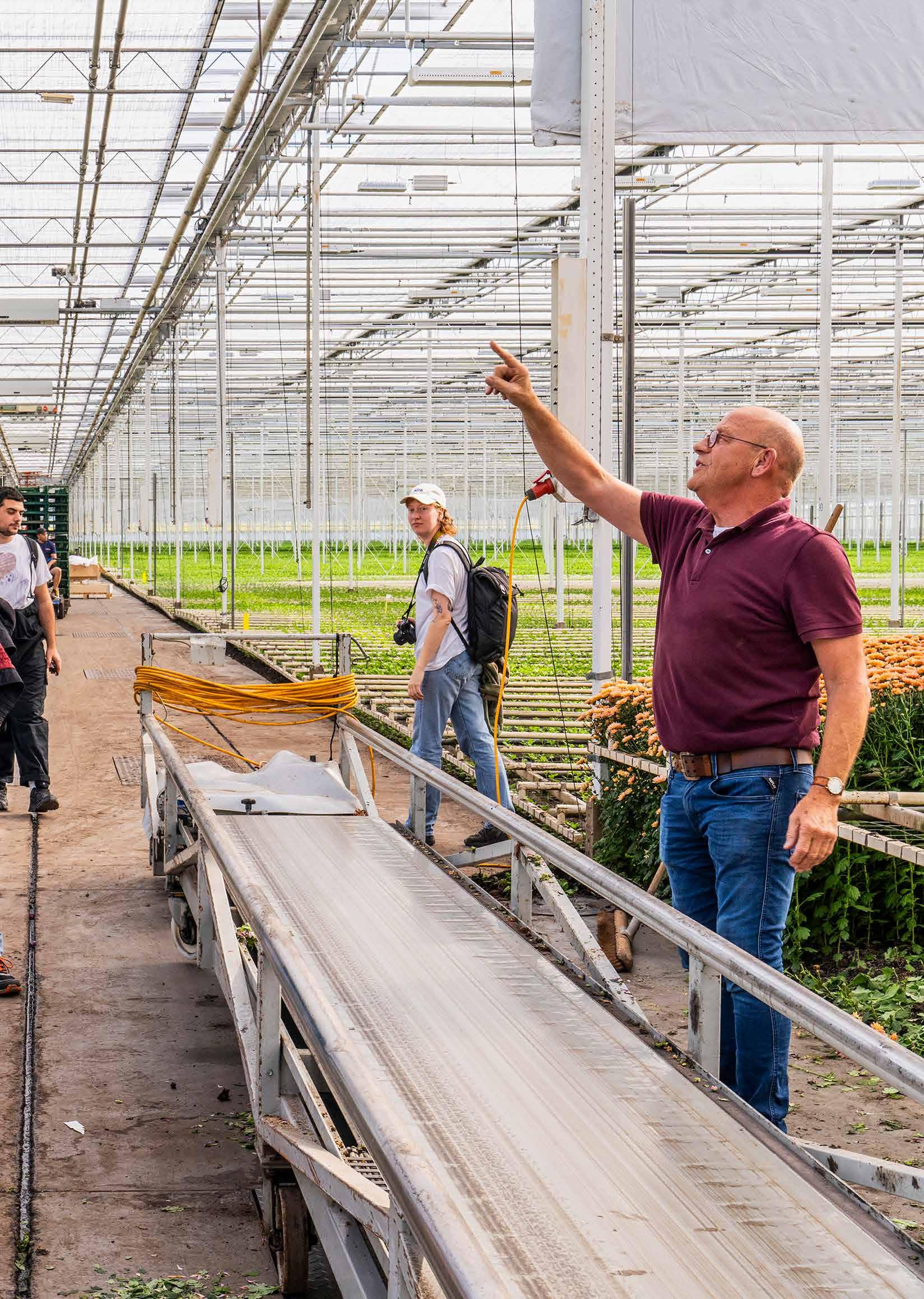
Aurélie Nyirabikali Lierman
Study load: 3 EC per semester
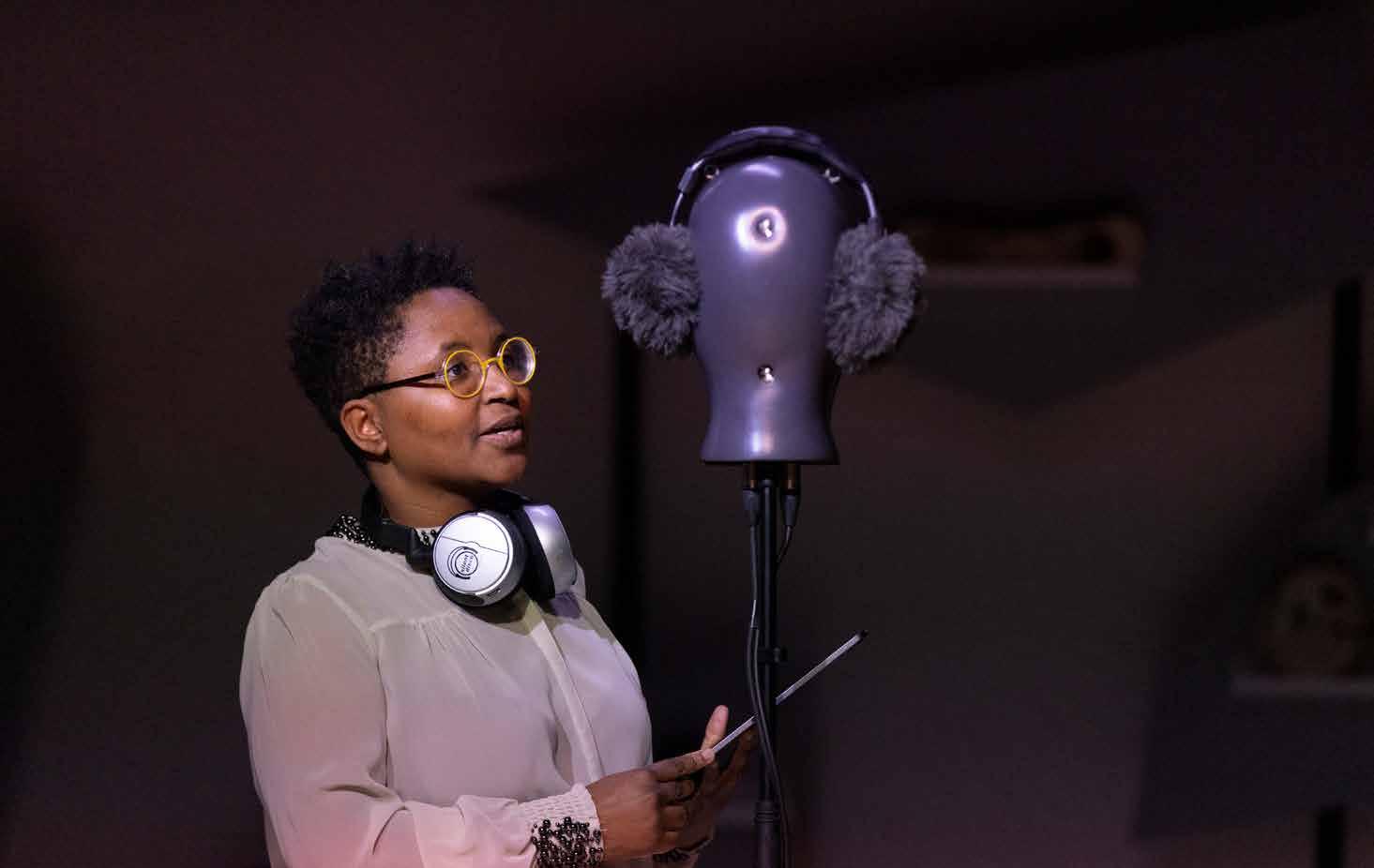
This course looks into storytelling through the language of abstract and concrete sound as well as the (non) verbal and (non) human voice. Students explore the art of listening by investigating diversity in perception and perspectives, and by experimenting with hands-on tools and vocal techniques derived from radio documentary, speech acting, performance, and music. Introduced to techniques such as foley art and field recording, they will learn to understand the impact of deliberately curated amplification and reflect on the effect of spatialization of sound and notions of time, whilst engaging with the emotional and subjective implications of sound.
Study load: 3 EC per semester

This course will teach students how to develop an investigative design practice that draws on the tools and tactics of journalism, with a focus on public-interest stories related to technology, society and politics. Participants will discuss the profession and culture of contemporary journalism as well as the developing field of artistic investigations, before learning practical skills such as how to construct compelling narratives, utilise analogue and digital investigative techniques, organise research and present a final project. Throughout the course students will put the investigative techniques into practice and work on their own visual investigation.
Niels Schrader
Study load: 3 EC per semester

In Information Design students undergo four distinct design phases: the generating, safeguarding, releasing and transferring of knowledge. These stages consider the key components of the design process and correspond to researching, evaluating, visualising and publishing information. Each semester revolves around a current political, socially relevant subject that students investigate in close collaboration with external partners. This approach allows students to experience a real-world application of academic research and to develop a social and political understanding of their lived realities.
Study load: 3 EC per semester

In this course students critically reflect upon the construction, appearance and distribution of visual language. They develop an understanding of the use of images and texts throughout different media in order to arrive at a more critical, conscious and articulate use of visual language. Throughout the course, students will collectively study a selection of historic and contemporary visual essays, both in print and film. Underlying methods and making strategies are analysed and discussed, as well as editing techniques and the relationship between words, spoken language and images.
Study load: 3 EC per semester
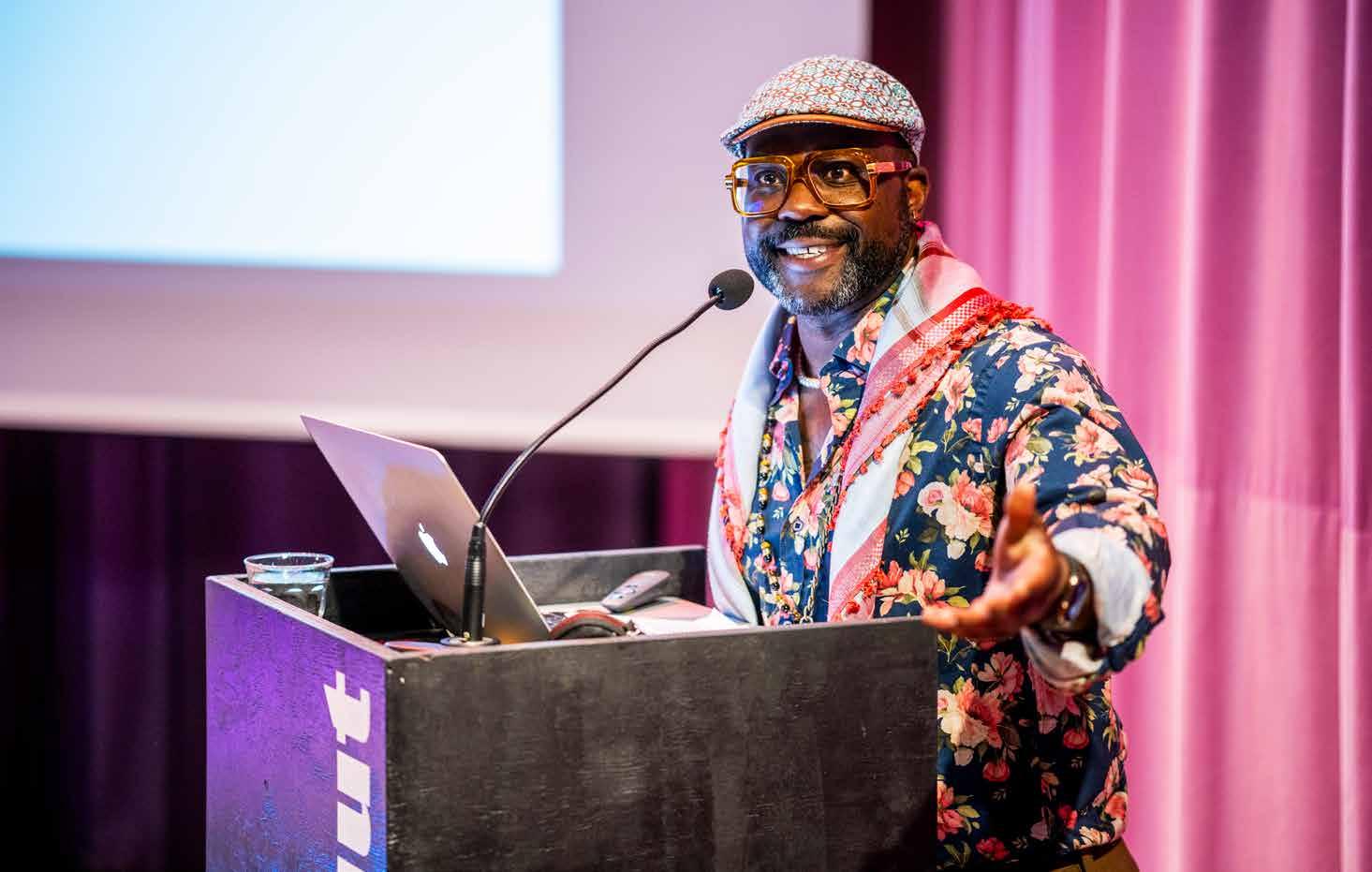
The objective of this course is to offer students practical, qualitative research skills along with critical, theoretical perspectives applicable to research and artistic practices in the digital age. The research methods introduced and practiced in this course are complemented by discussions on critical theory, or a philosophical approach to culture. This includes a reflexive assessment and critique of culture, including the challenges of power structures and cultural assumptions in psychology, sociology, and history as well as digital, race and feminist theory. By the end of this course, students should gain a deeper understanding of the relation between their artistic practices and various individual and collective experiences in the contemporary world.
belit sağ
Study load: 3 EC per semester
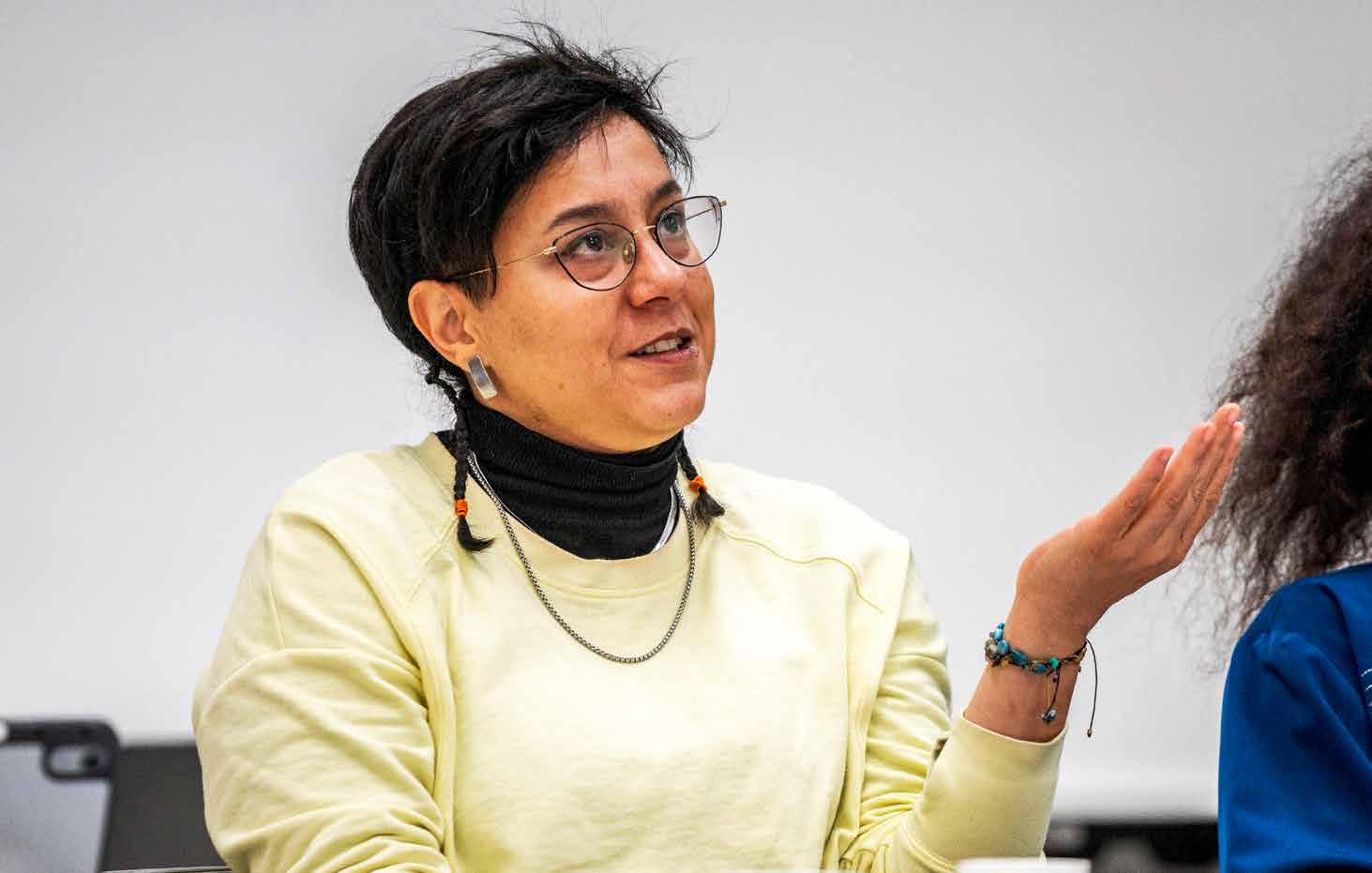
In this course, students gain a deeper understanding of various theoretical approaches to the relationships between activism, humanitarian and human rights discourses and feminist media philosophies. Emphasis will be paid to topics such as Eurocentrism, Western neutrality, decolonialism and institutional violence. The course aims to support students in developing complex analyses of modes of social organisation and power structures, their relation to systemic racism, sexism, classicism, and movements that organise around race, gender, and class liberation. By the end of this course, students will have an advanced theoretical vocabulary fundamental to developing their practice and positioning of their practice within broader contexts.
Edwin Jakobs
Study load: 5 EC
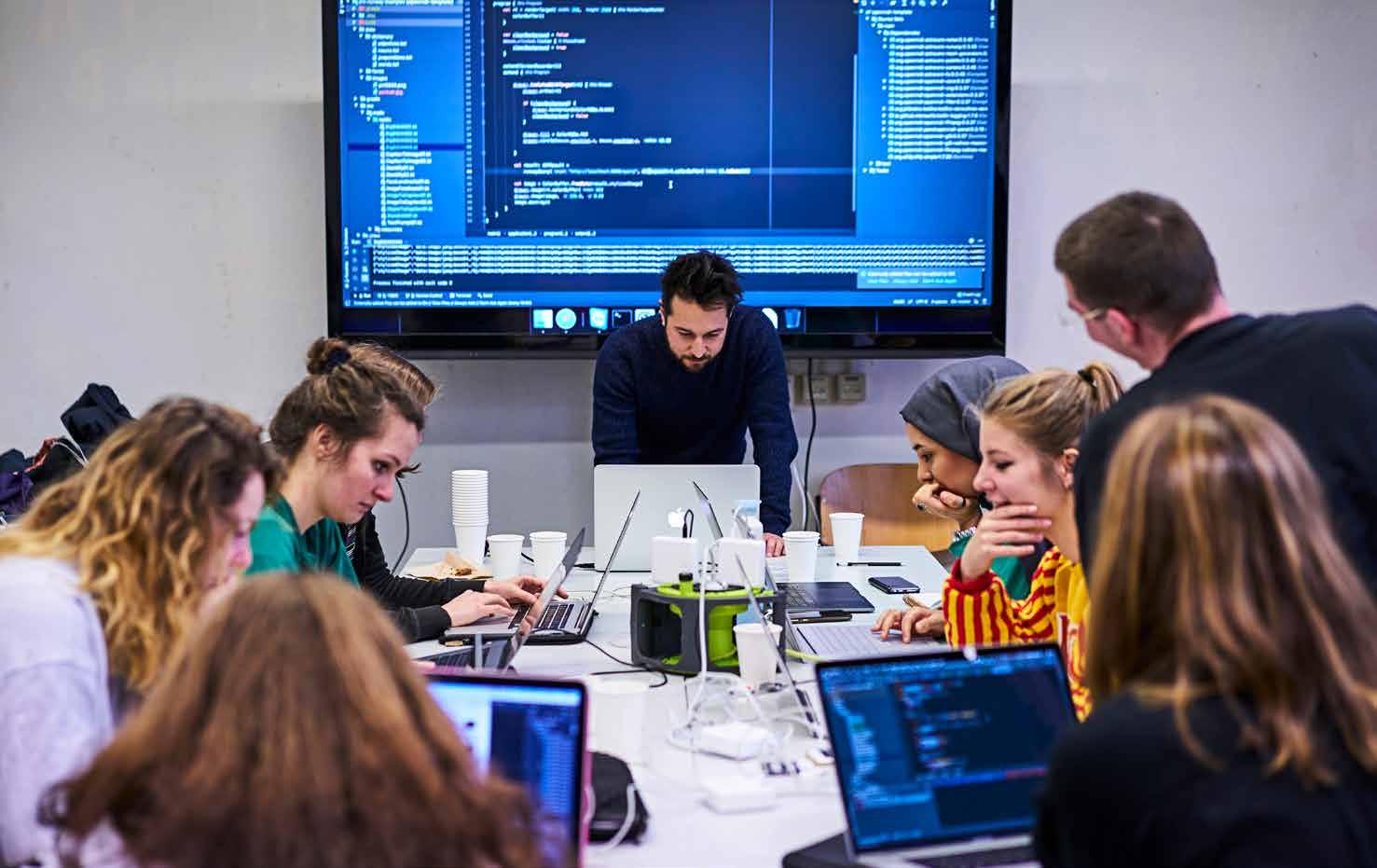
This course focuses on software as a creative medium that is shaped by information, interfaces, data structures and algorithms. It looks at code as a tool for both gathering and presenting research and emphasises how transforming raw data manifests into visual representations that make information more powerful, consequential, and actionable. In the first year, the course takes the form of both technical workshops and a larger ongoing project. In the second year the course extends the work done in the first year to apply to each specific practices and ongoing areas of research.
Maartje Nevejan

Documentary Film focuses on the art of non-fictional storytelling. During the course, students are familiarised with the technical aspects of filmmaking. In particular, they learn how to write a film plan, conduct interviews, utilise archival footage and implement audio recording. To deliver a personal approach to their projects, students are encouraged to explore alternative content formats, such as podcasting, mockumentary, virtual reality or video blogging. The course grants students a general understanding of how to write, shoot and edit a short video documentary. It explores narrative structures and visual languages of the genre. With filmmaking being an entirely collaborative practice, teamwork lies at the core of the programme.
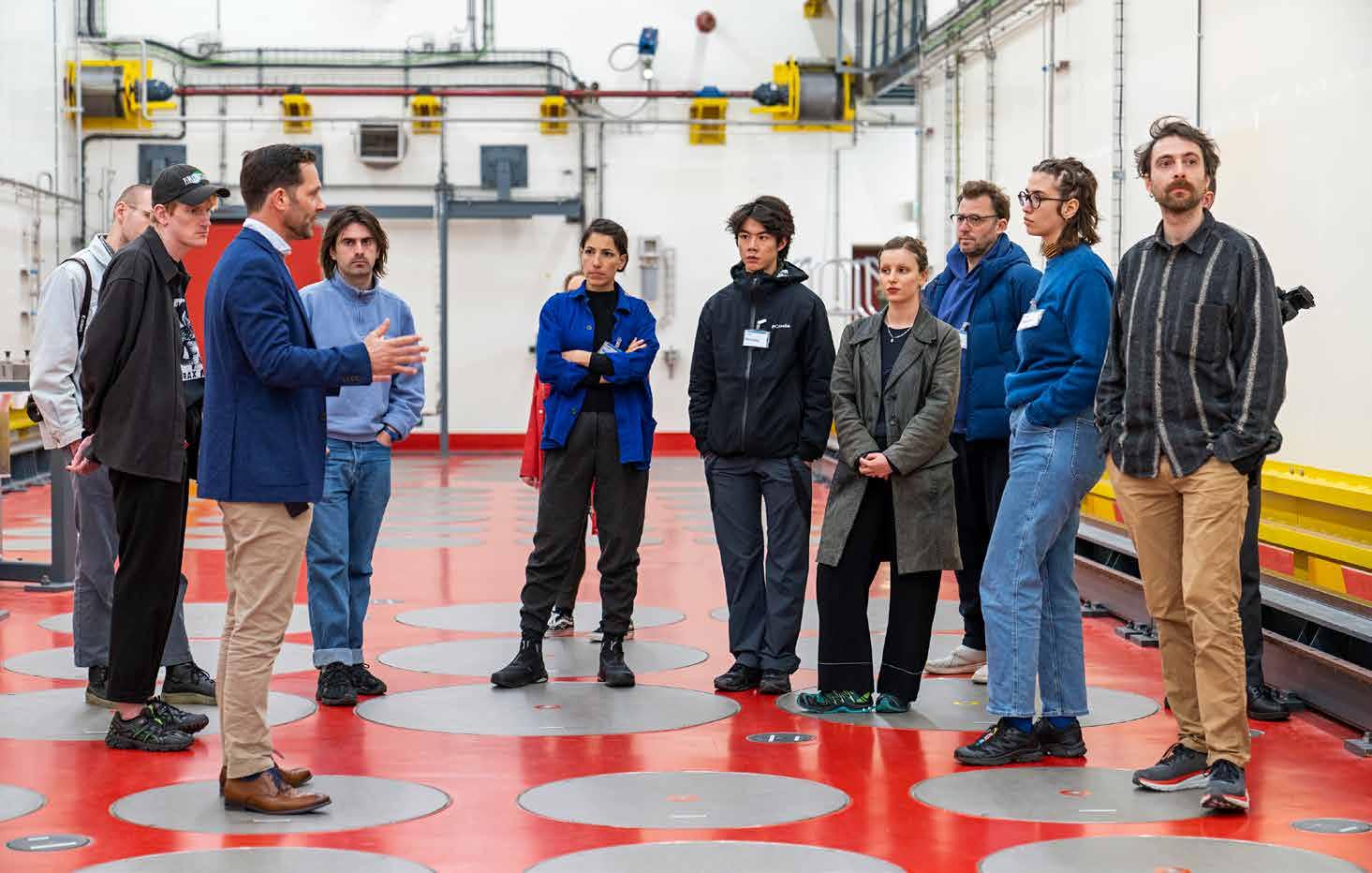
Central to this course is material research and processing. Students make use of the extensive workshop facilities of the academy and learn to make creative choices of materials to build spatial objects, e.g. scale models or three-dimensional maps. During the course, students experiment with different materials such as wood, ceramics, plastic, plaster, metal and 3D printing in order to develop a deeper understanding of their physical properties and eventually design and build their own exhibition furniture. Ultimately, they explore and experience the entire process of exhibition design and conceptual presentation.
Katrin Korfmann
Study load: 5 EC
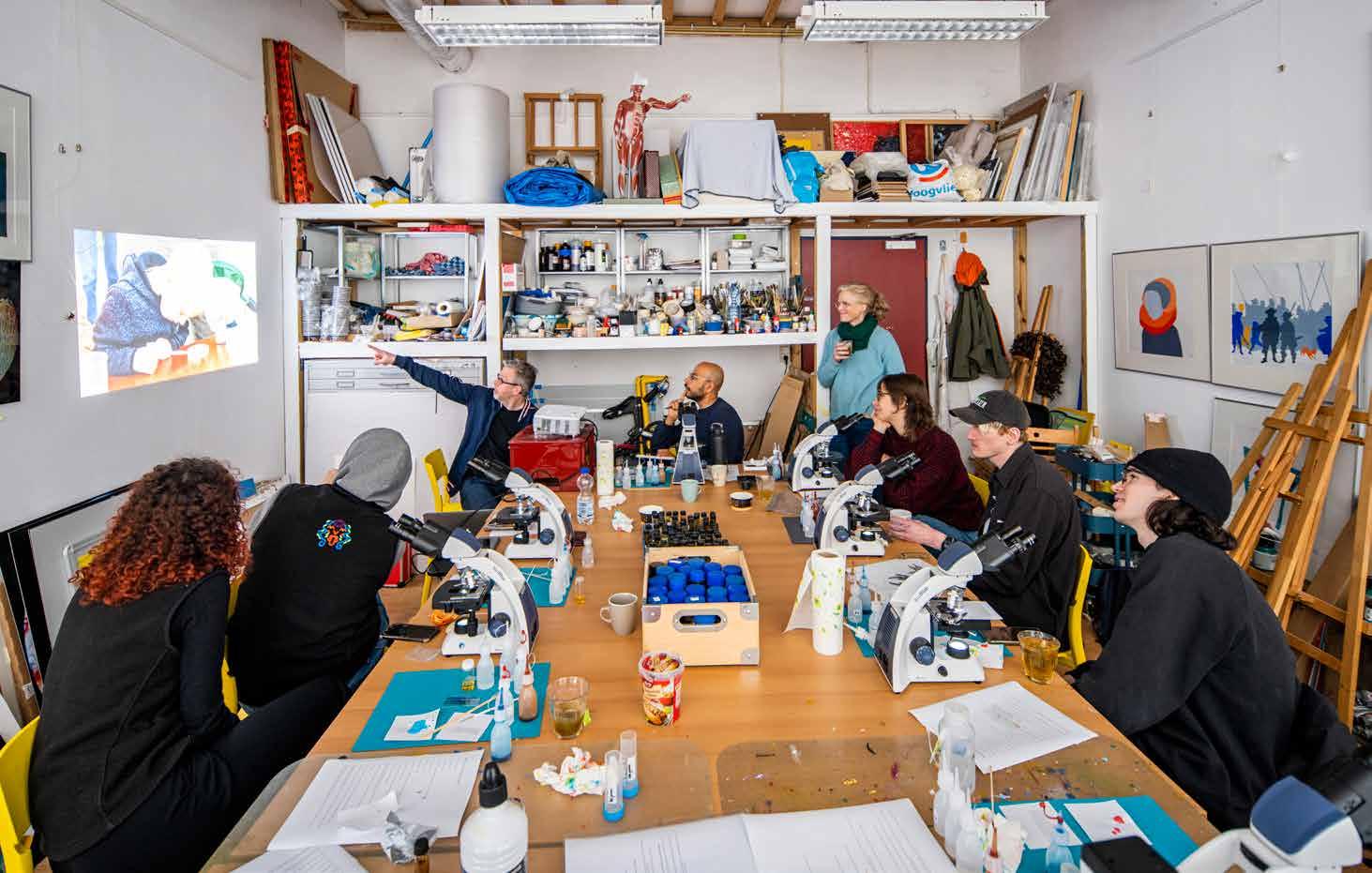
Post-Photography teaches students the use and application of lens-based research methods by means of various technologies and photographic post-production. During the course, they explore various documentation techniques such as photogrammetry, machine vision, microscopic photography, drone footage and forensic photography, as well as studio photography. Innovative post-production, image editing and presentation techniques are explored. Students learn to consider vantage points outside their comfort zones and pursue photography as an objective form of registration. They conduct practice-based research and develop critical thinking to explore contemporary stories.

In the second semester of the first year, students follow a thesis workshop to prepare for their thesis in the second year. This early start of the thesis trajectory allows topics to be explored and researched during the second semester of the first study year, giving students time to settle into their thesis topic before their second year begins.
Study load: 1 EC
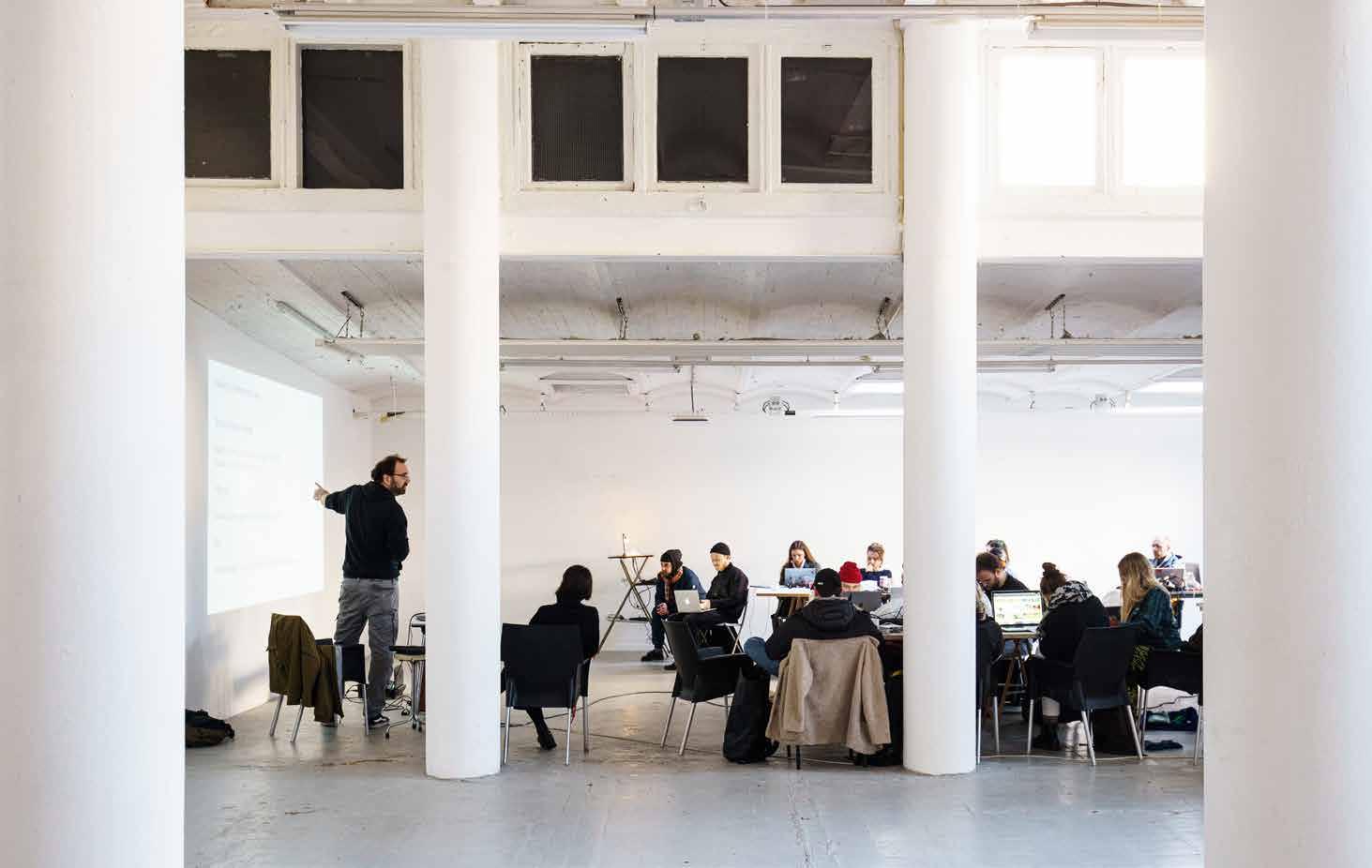
The Tech Week at the Non Linear Narrative department focuses on programming as a craft. It invites the students to create visual output by using abstract code to control physical means of automatisation. With the use of prototyping, participants explore and push the boundaries of digital technology. The study component is implemented in the curriculum in the form of a week-long, open, collaborative workshop and led by experts from the professional field.
Victoria McKenzie

This course presents climate change as an entangled, interdisciplinary, and social justice problem. Through decentralising the literature on climate from African, Indigenous and other spaces of the ‘Global South’, the course works towards understanding how restorying and restoration are aligned. Students engage on the platform that intervention isn’t just about revelation but using our artistic research skills, and non-linear storytelling methodologies as a means of interrogating an ecosystem of change, sustainability and new ways of being a species on a shared planet. Restorying Climate is organised in collaboration with the Master Artistic Research.
Study load: 1 EC

The Ethics workshop is a cross-departmental study component of the Master Artistic Research and Master Non Linear Narrative that focuses on ethics as a basis for artistic practices. In particular, the course supports students in their research practice, by investigating pluriversal forms of engagement with forms of life. In this course, students to interrogate cultural objects, their own work, and ethical commitments as an artist / designer / maker / researcher.
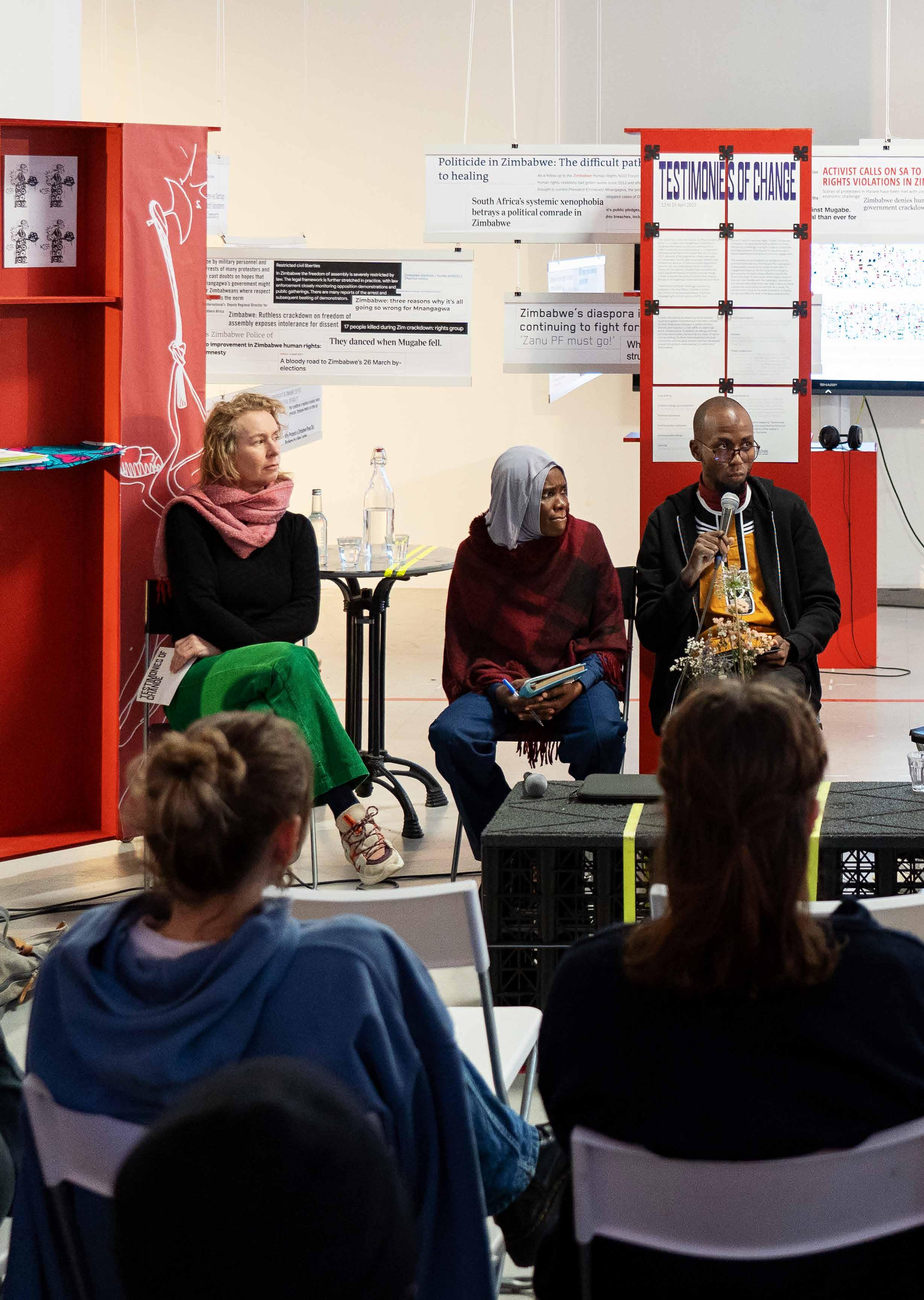

Study load: 9 EC per project
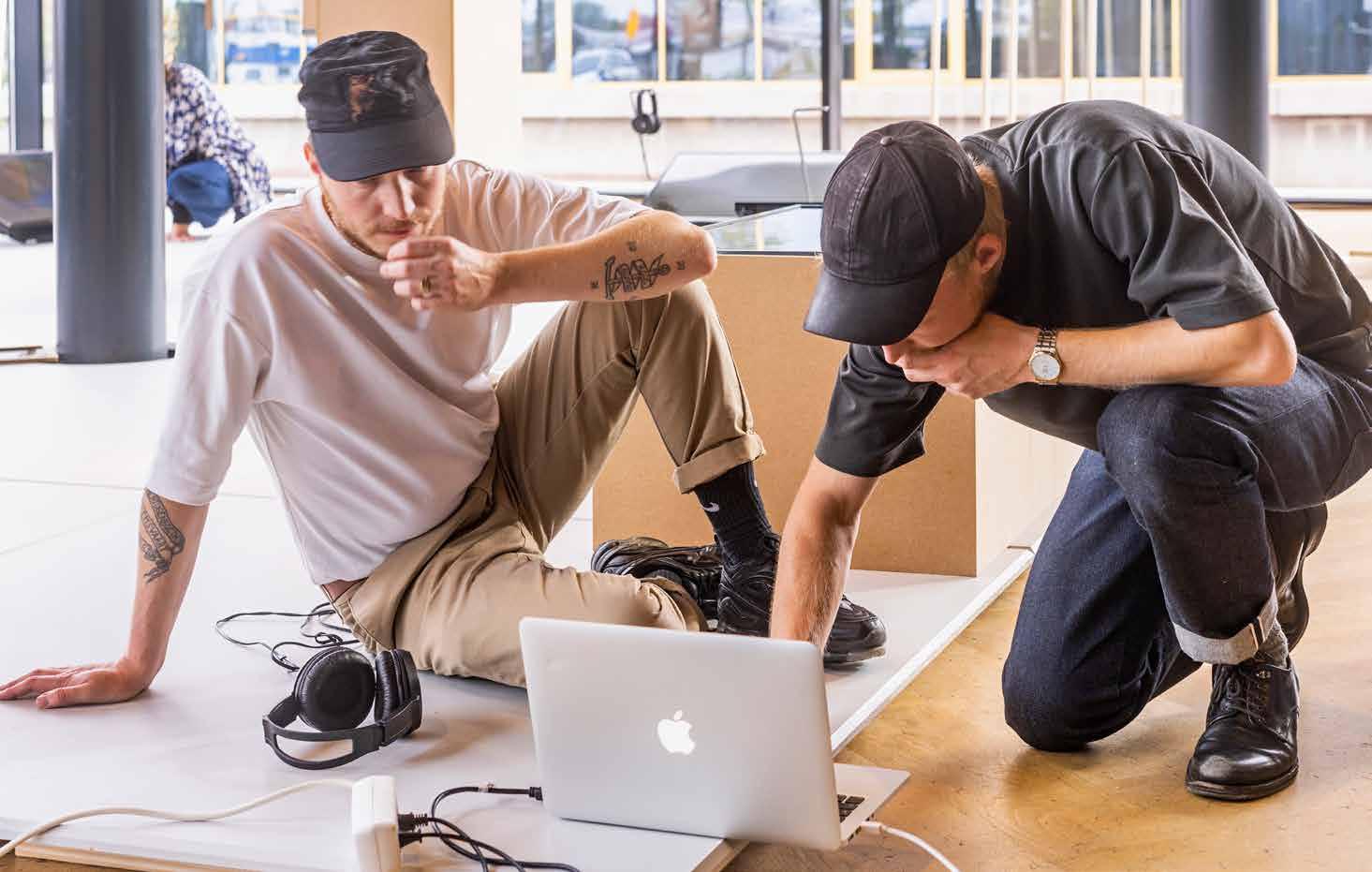
For their Individual Study Project, students undergo an individual study programme to define their research topics. Personal perspectives and interests will determine the content and scope of the assignment. A selected group of mentors will provide personalised feedback and assess the results collectively. The design and theory teachers monitor the study progress, whilst lab teachers are available for technical guidance. Overall, the student creates two Individual Study Projects.

In the first semester of year 2, students write their thesis. While the format is academic, the topic is entirely open. It is advisable that students focus on the research that will support and enhance their practical work for graduation. By writing the thesis, students learn to utilise their research skills, convert their findings into writing and are able to navigate different academic disciplines. Through presentations and discussions, students learn to articulate their work, situate their insights in a broader scope and develop the ability to finetune their capacity for reflection and investigation.
Study load: 26 EC
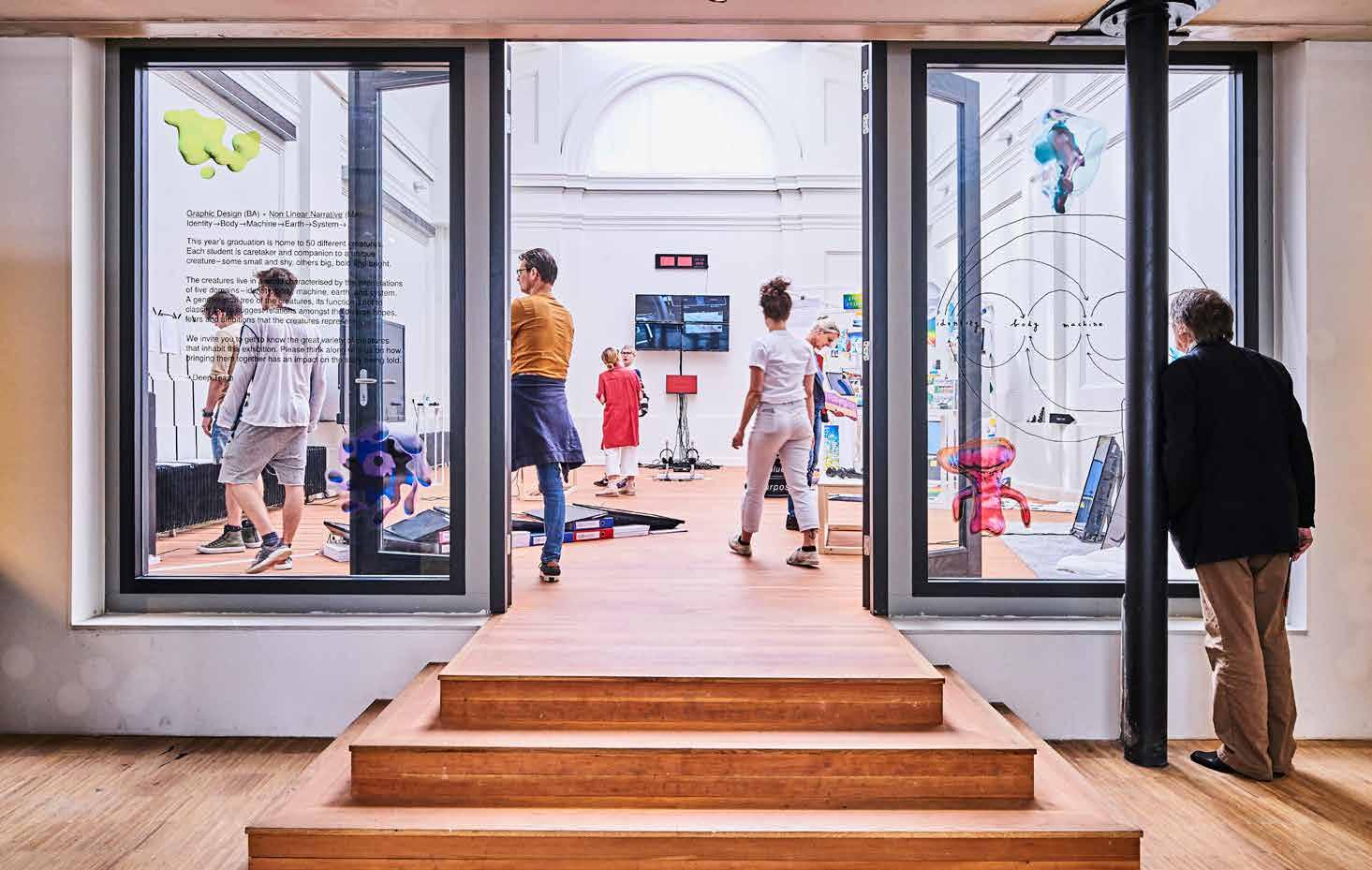
For their Final Examination, students choose their own examination subject. Personal perspectives and interests will determine the content and scope of the assignment. A selected group of mentors will provide personalised feedback and assess the results collectively. Over the course of the last semester, students will undergo two green light assessments during which they present their progress and plans for the graduation show.
Oliver Doe
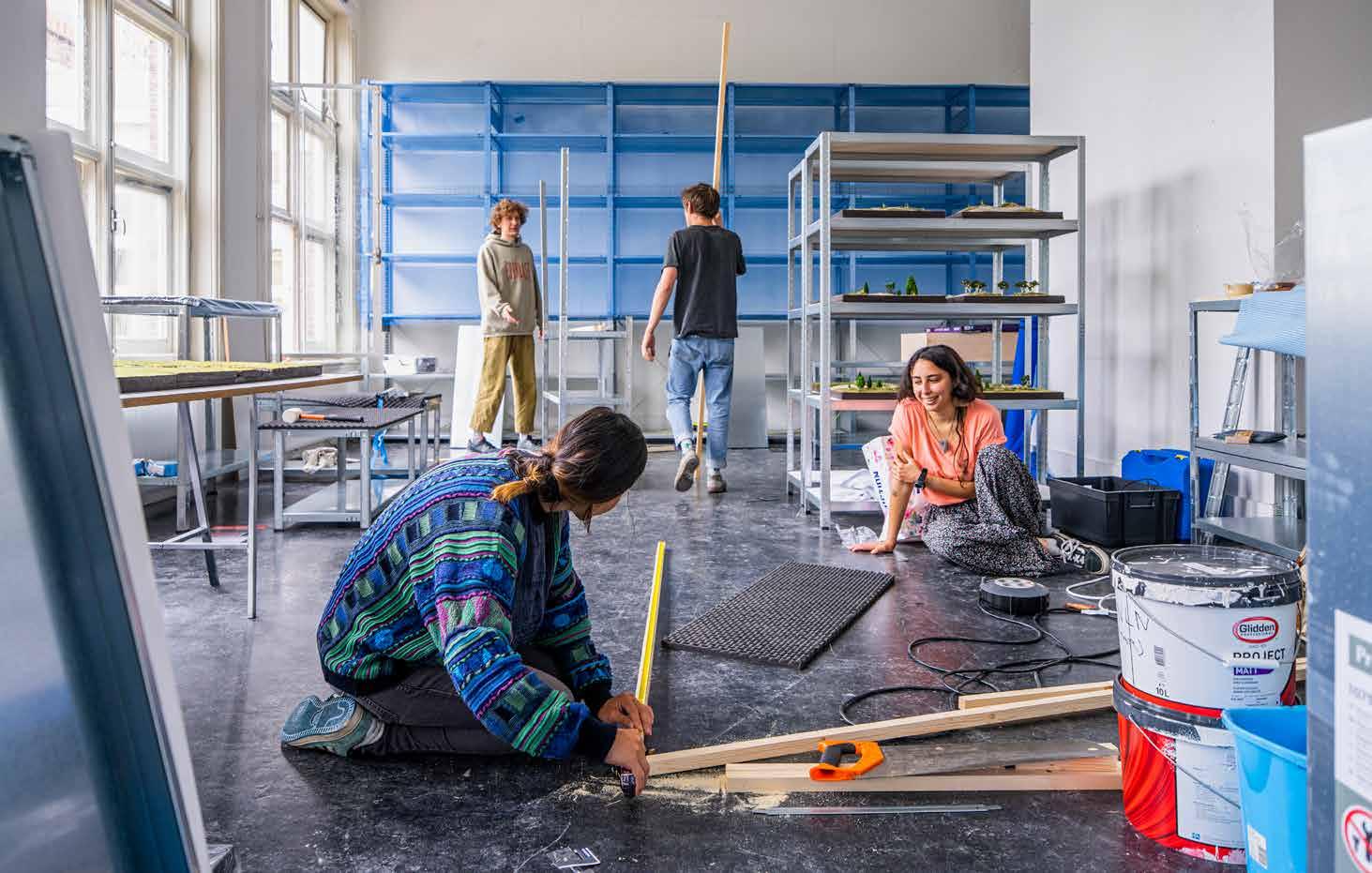
To prepare for their graduation show in their second year, this course provides an opportunity for students to plan and discuss the presentation of their final projects. The course encompasses the practicalities of programming and materialising an exhibition, ranging from concept development (theme, scenography, graphic design, publicity, signage, etc.) and production (financial overview, logistics, material resources for build-up and break-down of the show), to the presentation of their final exam (including an oral and material presentation). The course offers context for making realistic decisions in relation to their final project, thereby training the students for the reality of their professional life.
Study load: 2 EC
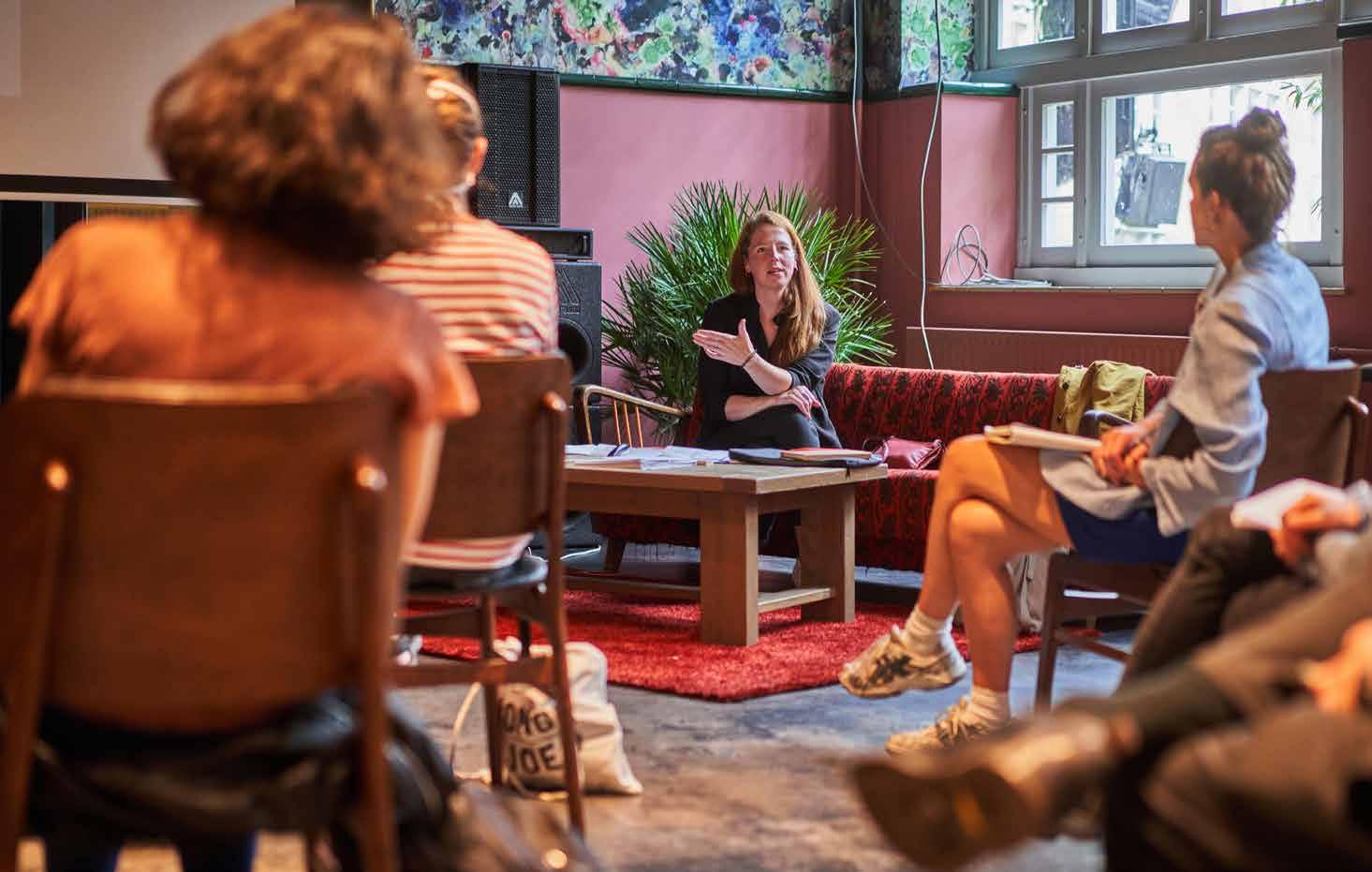
During Professional Practice, students learn and exercise entrepreneurial skills needed to build an autonomous professional practice. The course is split into two parts: Administration and Dissemination. Administration focuses on management competencies like accounting, funding and budgeting, whilst Dissemination pays attention to public positioning, networking and enables opportunities to connect with alums and field professionals. The course collaborates with experts from various professional fields, including cultural funds, copyright organisations and autonomous curators.
Study load: 1 EC
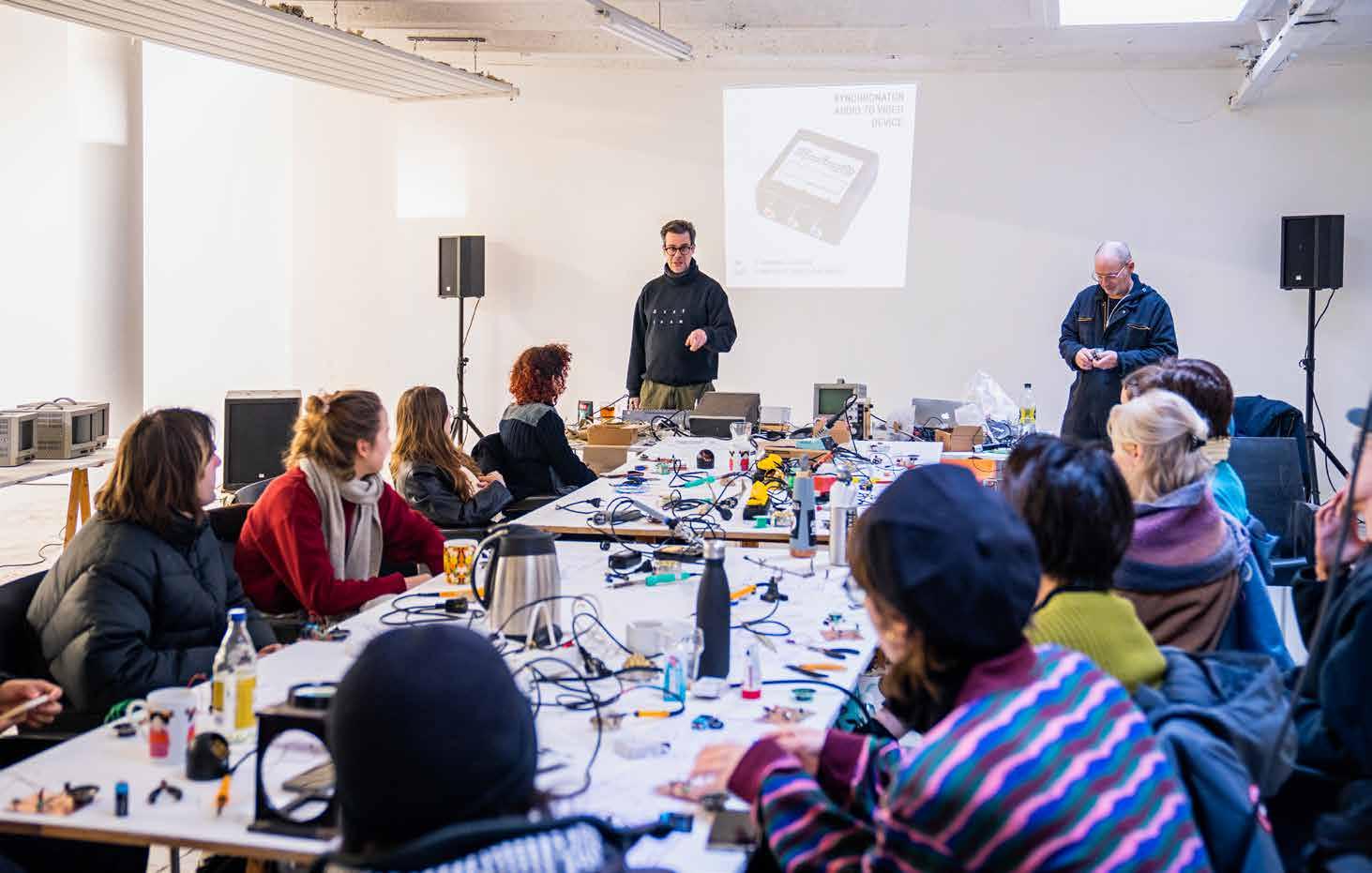
The Tech Week at the Non Linear Narrative department focuses on programming as a craft. It invites the students to create visual output by using abstract code to control physical means of automatisation. With the use of prototyping, participants explore and push the boundaries of digital technology. The study component is implemented in the curriculum in the form of a week-long, open, collaborative workshop and led by experts from the professional field.
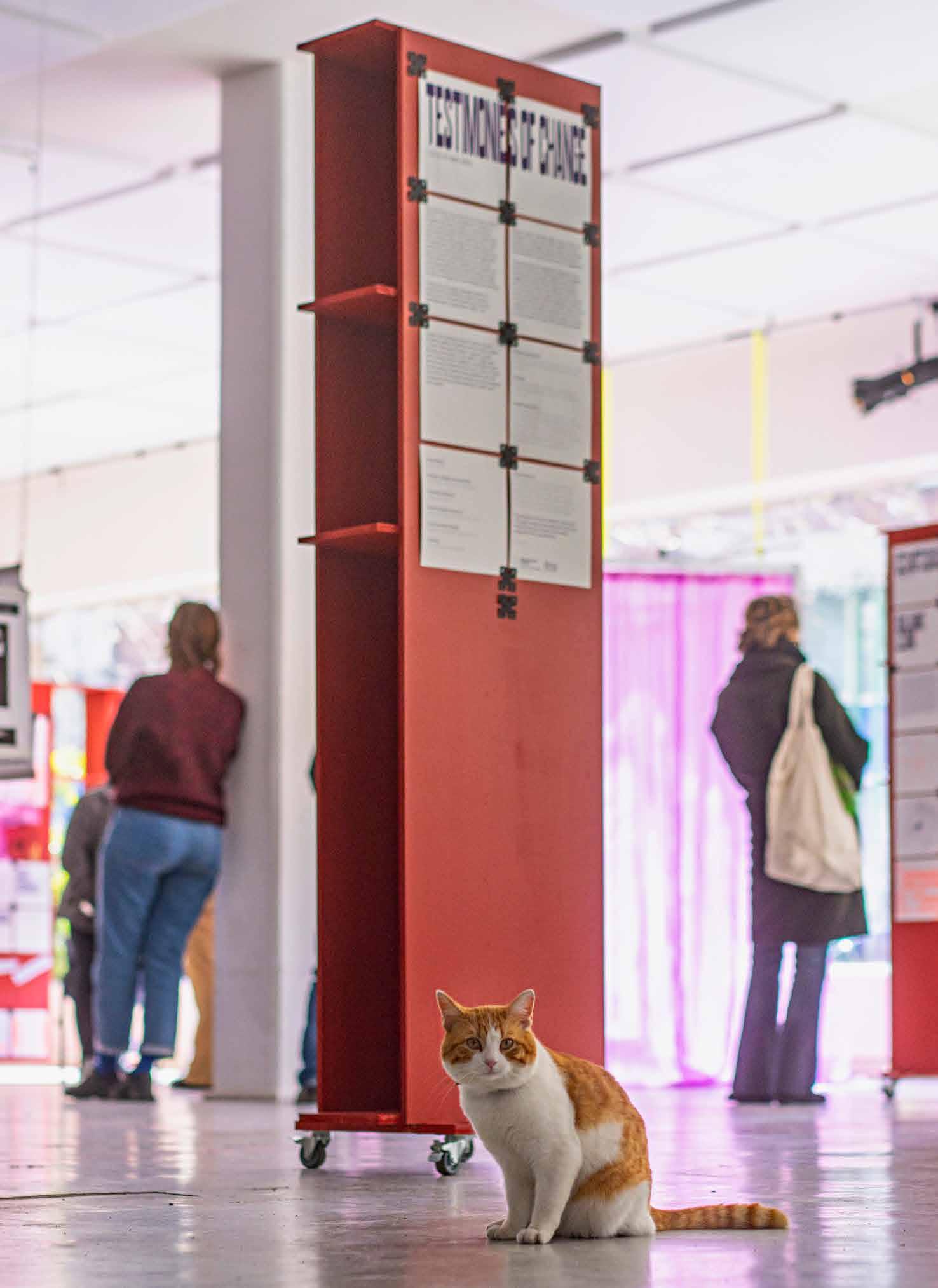
The Master Non Linear Narrative has chosen to adopt the seven nationwide competencies (Competenties Bachelor Vormgeving) for its study programme. These competencies are: creative ability, ability for critical reflection, ability to grow and innovate, organisational ability, communication skills, external awareness, and ability to collaborate. They are consistent with the “Dublin Descriptors”, developed in 1999, and centred on student development rather than the deliverables. The competencies are considered to be reference points, which reflect knowledge, skills and attitudes of the student. From the first to the second year, the assessments are using the very same set of competencies, which helps to track student progress over time. During their two years of study at the Master Non Linear Narrative, students undergo seven different types of evaluations:
During the admission procedure, prospective students and the department verify whether they are a good match. The candidates apply with a motivation letter, a cv, and their artistic portfolio. They also need to complete a home assignment to demonstrate some basic interest in programming. The applications are then reviewed by a team of 2 teachers and 1 enrolled student, focusing on the artistic quality and motivation. Based on their recommendations, a selection of candidates are invited for an interview with a different team of teachers. If only possible and practical, these talks are conducted face-to-face, or online otherwise. During this second selection round 14 applicants are eventually admitted to the programme. If necessary, the department works with a waiting list.
To prepare the students for their January and June assessments, the department provides a progress meeting halfway through the semester. During this meeting, students present their ongoing work to a few tutors and their fellow students in order to receive concrete feedback. These conversations allow teachers to check in on the students’ progress, advise them on the remaining workload and deadline, and align the study load where necessary. The reviews give students the opportunity to express any comments or concerns at an early stage and to take crucial decisions in a timely manner. To stimulate peer-to-peer interaction, the style of these meetings is informal and does not include grades. Students receive a written summary of their feedback to encourage deeper reflection.
During the individual assessment at the end of every semester, students reflect separately with each supervisor on their work, methods and progress. The teachers take the learning objectives and deliverables as an indicator of progress, but also look holistically at the overall development of the student. Their feedback is disciplinary by nature and aimed at reinforcing personal development. Assessments are also shared in writing, soon after the feedback sessions. Students receive a pass or fail, as an evaluation of their progress in the given discipline. Passing into the next year, however, is not decided by individual marks but by the collective assessments.
Each semester is concluded by the collective assessments. The evaluation of the artistic quality emerges from the dialogue between professional peers, each from a different background and perspective. This allows for a collective and interdisciplinary
evaluation. During the assessment, the team provides qualitative and development-oriented feedback. In this interactive session, student and teachers together formulate feedforward for the coming period. The collectives are open to all the students from the department, which allows peers for note taking. Deliberations, however, take place without the students. It’s here where teachers give a collective grade (pass or fail), link the students’ performance with the competencies and assign 30 study points. Collective feedback is also shared with the student in writing.
Before the collective assessments, students fill in a self-evaluation form. These evaluations help students not only to keep track of their own strengths and areas for improvement but also to mentally prepare for the collective evaluations. In conversation with the teaching team, conclusions from the form can be converted into personal learning objectives. The self-evaluation is also a reflection moment, through which students can share personal concerns and / or advice towards the programme. This feedback is then discussed and evaluated together with the class coach.
In their graduation semester, final exam candidates have three assessment moments leading up to the graduation: two greenlight assessments and one final exam. The final exam is typically planned during the last week of the semester, whilst the greenlight assessments are scheduled at the beginning of the term and after its first half. These three checkpoints are conducted by the tutors teaching in the final year of the programme together with the department head and an external examiner. During the first greenlight assessment, students present an unrefined proposal of their final project. Each graduate has a maximum 20 slides to explain the plans for
the upcoming exam and to clarify the relevance of the work for a non-academic audience. Upon completion, students receive a personalised written feedback and indicate their preference for the two core mentors to supervise their exam.
The second greenlight assessment results in a positive or negative advice. The positive advice, or a “green light”, means that the student is progressing well towards the final exam, but does not mean graduation is already certain. Students with a negative advice (“red light”) get a strong – but not binding – advice to discontinue their project, and consider a restart. An “orange light” indicates that the trust into the presented project proposal is not fully established yet and extra measures need to be taken to increase the quality of work.
During the greenlight assessments and the final exam, the role of the external examiners is to ensure a fair examination process and provide students with additional feedback. Prior to the first greenlight, the examiners receive information about the graduates’ study progress and the thesis abstracts from the first semester. During the final exams the group of examiners is oftentimes complemented by a representative of the Examination Board. They are responsible for safeguarding the quality of the final exams and ensuring that the assessments are carried out according to the Education and Examination Regulations (OER). The final assessment puts the focus on determining whether the student is ready to join the professional practice. The decision is communicated in a form of a simple “pass” or “fail”, as the department refrains from giving grades to the students. Instead, personalised written feedback on their study trajectory is provided, intended to help with starting their professional career. Typically, the written reflection also elaborates
on the evaluated competencies, but that is not necessarily required as a reviewed summary of those competencies is also provided.
During the exam, graduates present their work to a total of two assessment committees. This procedure was originally established to reduce the number of panel members to a less intimidating size, but presenting the work twice has been proven to provide other significant benefits. It also allows students to improve their presentation based on feedback given after the first of the two rounds. With its built-in rehearsal moment, this routine increases the students’ general level of self-confidence and quality of graduation, while decreasing presentation anxiety.
The underlying framework for the final year and its deliverables is a design process consisting of four distinct phases: generating, safeguarding, releasing and transferring of knowledge. Each of these creates in fact opportunities for the students to advance all of the seven competencies adopted by the department. The design phases ultimately determine the following two outcomes for the final exam:
1. A written graduation thesis in the first semester of year 2 (generating and safeguarding knowledge);
2. An extensive final exam project in the form of an artistic interpretation of the conducted research in the second semester of year 2 (releasing and transferring knowledge).
The deliverables are presented at the end of the second year during the Graduation Show and published in the Graduation Catalogue. As part of the graduation show, students are also expected to deliver a project description of roughly 500 words in the weeks before their final exam.

The thesis is the theoretical underpinning of the graduation project. It allows students to explore the wide range of information and resources related to a chosen topic. In its research phase, graduates make an inventory of questions associated with a specific design problem, identify potential sources and collect relevant content or data. During this process, students formulate a research question that helps them to navigate the vast amount of input.
After exploring and gathering information, students start to interpret and assess their findings. Ideally, they manage to formulate an answer to the research question developed earlier. The scope of this answer determines the volume of the thesis, which amounts to about 10.000 words. An additional abstract of 500 words, summarising the main thoughts, is used for the production of the Graduation Catalogue.
The final exam project, on the other hand, translates the conducted research into a concrete and tangible design outcome. Students are expected to develop an innovative concept and cast the research results into an artistic form. By means of images, typography, interfaces and other media, the designer develops methods of how information is structured, logically arranged and then visually displayed. Where images are not sufficient, sound, texture and even smell or taste are used. Examples include video work, interactive websites and printed books.
The examination concludes with an exhibition, during which graduates put their final exam project on display. During the preparations for the show, students make their projects accessible for a successful dissemination to wide audience. The implementation is a group effort, during which all students work together on one collective event.
The first year of the study is an exploration of the students’ research qualities. Students learn to connect the knowledge gained in previous studies to the design discipline and how to apply various research methods. Much emphasis is placed on developing an open-mindedness towards understanding of socio-political issues, a holistic understanding of environmental-ethical problems, and acquiring a methodological work process. In this year, the department offers a designated framework of assignments, in which the students train their collaborative skills and gain insight into the complexity of real-life communication challenges. Students are encouraged to develop their own opinions and to position their research within a wider academic context.
1. Creative ability
Students can formulate a design problem and use research to develop a design solution.
2. Ability to reflect critically
Students can relate their own work to developments in the profession in a cultural and social context and take a position in this.
3. Ability to grow and innovate
Students can further develop and deepen their vision and abilities and their work and working method, in a way that suits their personality and is related to their discipline.
4. Organizational ability
Students can set up and maintain an inspiring and functional work situation for themselves.
5. Ability to communicate
Students can present and explain their work (manner) convincingly.
6. External awareness
Students can make connections between their own work and that of others, and between their own work and the public. The student can respond adequately to target groups with their work.
7. Ability to work together
Students can be goal-oriented in different roles and with different responsibilities and interests in the communication process.

The second year of the study is all about working independently. To a large extent, the students themselves are expected to be proactive in seeking feedback and formulating their own research assignments. Based on their own skills and interests, students can choose their means of communication and presentation techniques. Investigating, formulating, designing, as well as disseminating a complex narrative become key objectives. This applies to writing the thesis and developing the graduation work. Additionally, part of the study year is dedicated to professionalising the students’ practice and considering how to proceed after graduation.
1. Creative ability
The student is able to create authentic visual work that is based on research and in which an artistic vision becomes visible. The visual work has meaning and arises from the personal ambition of the designer.
2. Investigative ability
The student is able to investigate and develop research methods by considering, analysing, problematising, positioning and assessing their own work, working methods and that of others.
3. Ability to grow and innovate
The student is able to continuously develop and deepen their own work and working method and thereby bring about changes within the profession, discipline, culture, and society.
4. Organisational ability
The student is able to set up and maintain an inspiring and professional work environment.
The student is able to express their ideas, concepts, work, working method, artistic vision, motives, considerations and research conclusions to professionals and the public from within and outside the field.
The student can actively and critically change the context in which they find themselves with their work, working method and research.
The student is able to initiate a collaboration and independently and actively contribute to the creation of an artistic product or process.
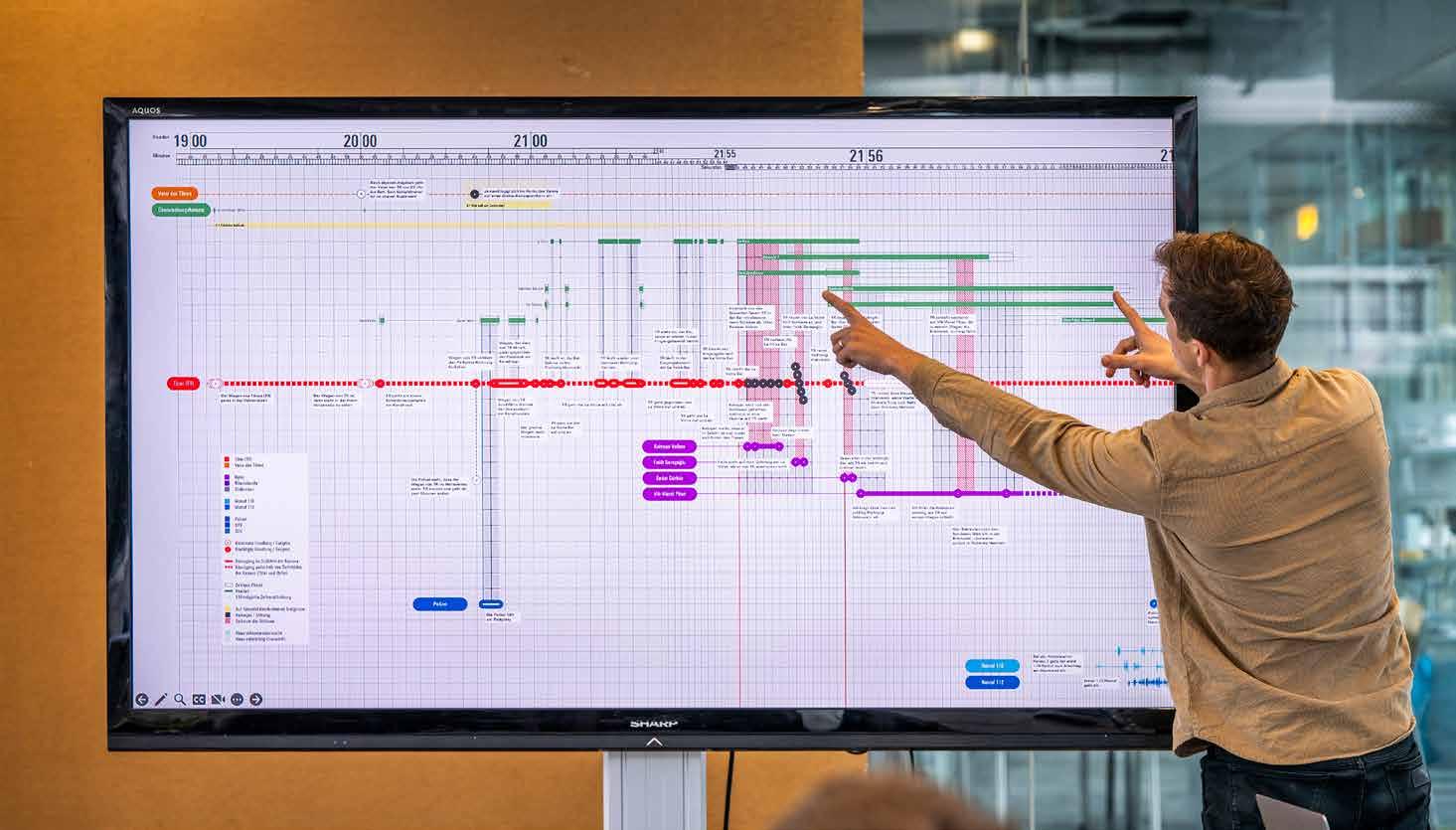
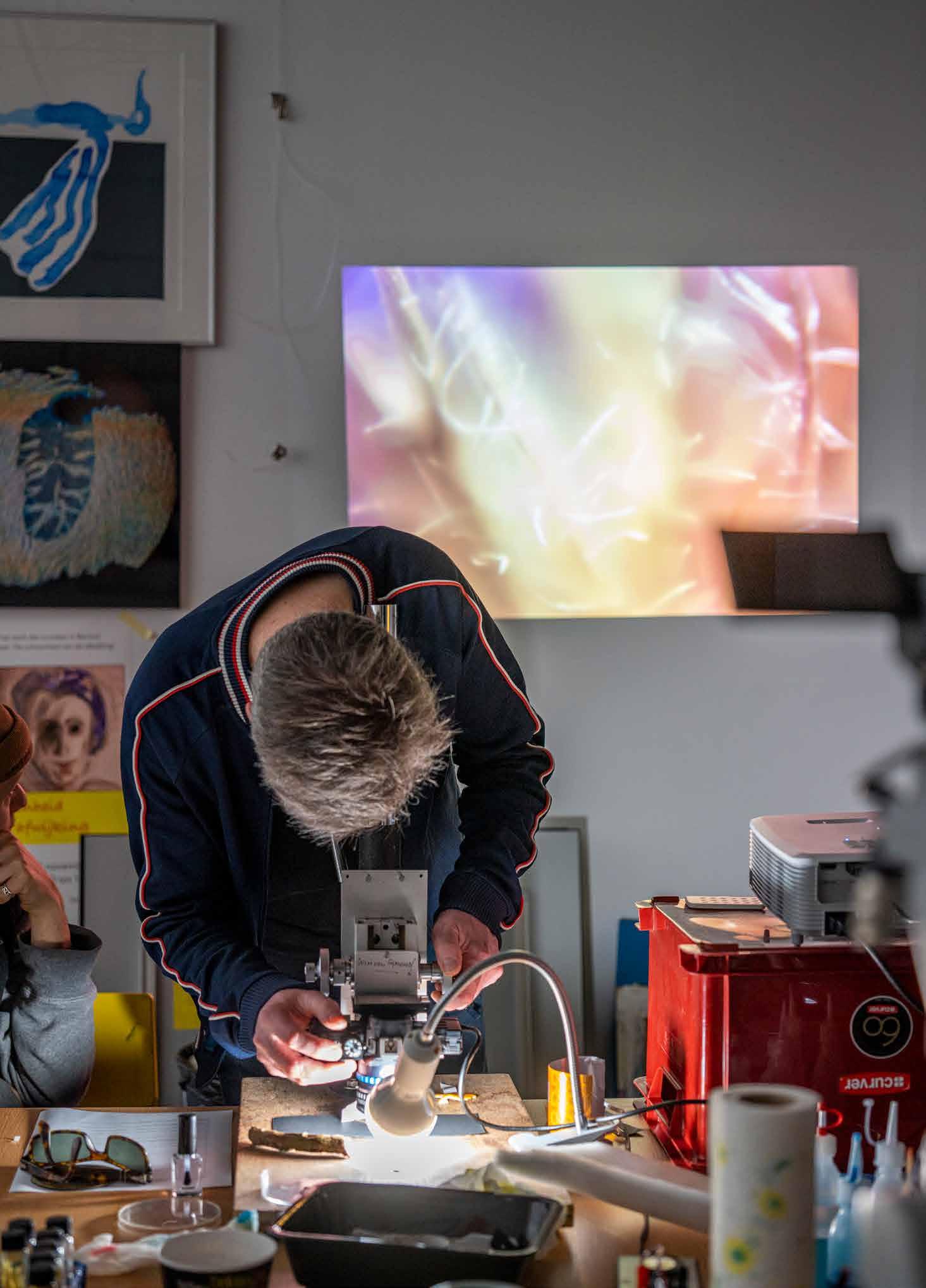
ARTISTIC PROFESSIONAL DOMAIN Aurality and Orality (Aurélie Nyirabikali Lierman)
Language (Linda van Deursen)
Stories (Evaline Schot)
Information Design (Niels Schrader)
Coding (Edwin Jakobs)
(Katrin Korfmann)
Film (Maartje Nevejan)
PROFESSIONAL PRACTICE Professional Practice Skills (Pia Pol)
(Mijke van der Drift), in collab. with MAR
(Victoria McKenzie), in collab. with MAR
Workshop (belit sağ and Ramon Amaro)
(belit sağ and Ramon Amaro)
(Oliver Doe)
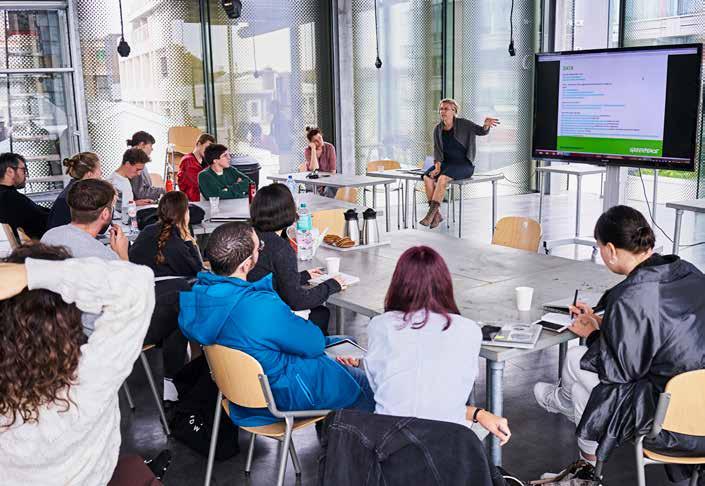
2018–2019
Views from Above
Greenpeace Netherlands, Amsterdam
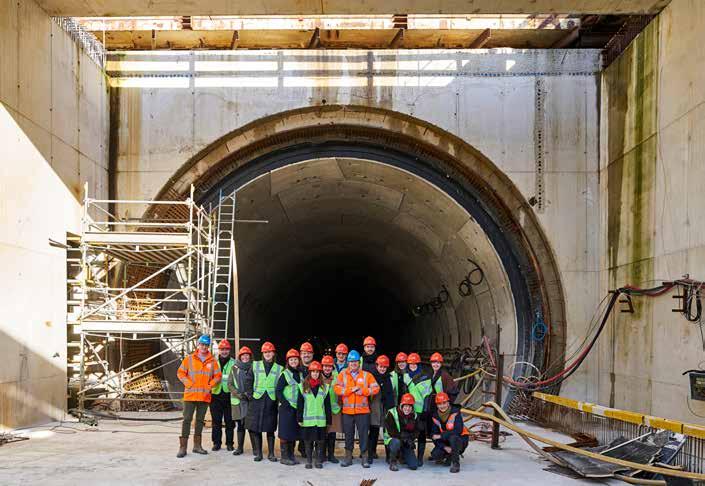
2019–2020
Six Degrees of Separation
Archaeology Department of the Municipality of The Hague and Stroom Den Haag
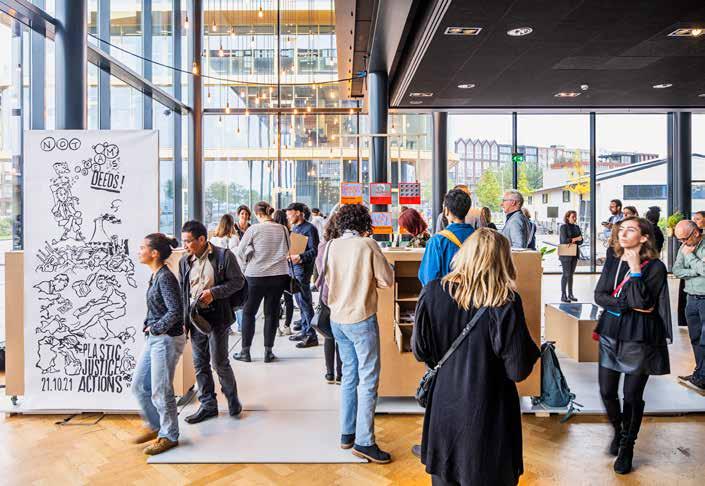
2020–2021
Plastic Justice
Plastic Soup Foundation, Amsterdam

2021–2022
Books Make Friends
KB – National Library, The Hague

2019–2020
Dutch Parliament, The Hague

2022–2023
Testimonies of Change
Hivos, The Hague
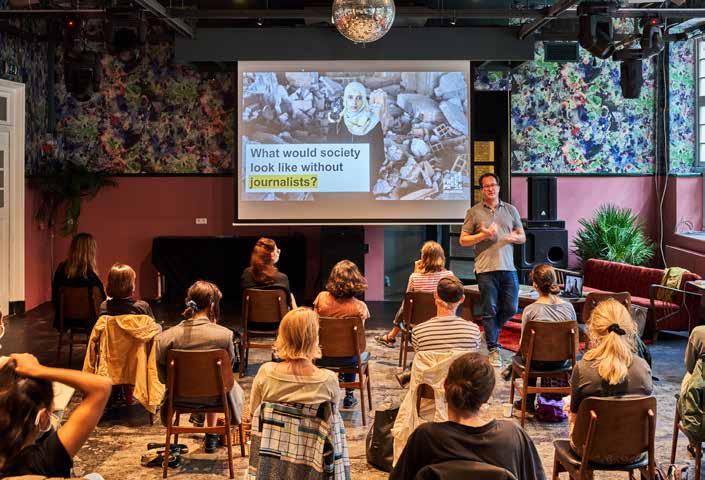
2020–2021
Facts Not Filters
Free Press Unlimited, Amsterdam

2023–2024
Unmapping Territories
National Archives, The Hague
Ramon Amaro’s writings, research and practice emerge at the intersections of Black Study, digital culture, psychosocial study, and the critique of computation reason. Ramon’s latest book, The Black Technical Object: On Machine Learning and the Aspiration of Black Being (Sternberg, 2023) explores how the history of data and statistical analysis informs the complex relationship between race and machine learning.
Linda van Deursen is an independent graphic designer. With Mevis & van Deursen (1987–2022) she worked for cultural clients and has produced identities for major cultural institutions such as Stedelijk Museum Amsterdam, Museum of Contemporary Art in Chicago and events such as documenta 14 and Venice Biennial. She has edited and designed numerous books for artists, photographers, architects and designers.
Oliver Doe is the course coordinator for the Master Non Linear Narrative programme, and also works independently as an artist, writer, and curator. Their own transmedia practice explores queer language and communication through varying levels of coding and abstraction, incorporating painting, performance, text, and photography amongst other media
Mijke van der Drift has formal education in dance, theatre and philosophy, and additional work experience in film and light design. Their research emphasis lies on developing philosophy as dramaturgical approach that can be applied to a host of different directions in work and research. Mijke is working in Visual Communication at the Royal College of Art since 2019, and currently as tutor for the School of Communication. In the Netherlands, Mijke
has previously worked as tutor at i.a. School for New Dance Development, Sandberg Institute, and Hogeschool voor de Kunsten, Utrecht.
Edwin Jakobs teaches Coding in the Master Non Linear Narrative. Before becoming a partner in RNDR he was the lead software engineer at LUSTlab, and a programmer at Treparel, where he was in charge of visualisation and automatic classification of patent documents. He is fluent in numerous codes in the fields of Computer Graphics, Machine Learning, Natural Language Processing, and more, and is the main developer of the OPENRNDR framework application.
Victoria McKenzie is an academic-activist, educator and artist. Her work focuses on the interconnections and entanglements of Earth where the realms of the individual, collective (human and more-than-human) and systems align. Trained in Research Architecture and Ecology, Victoria currently runs an architecturalresearch agency called ‘RRA’ Radical Research & Re-storying Agency which is informed by the question: “how can the pre-colonial past inform a decolonial future?”. Currently, Victoria also teaches at St. Joost School of Art and Design for the ‘Ecology Futures’ pathway.
Katrin Korfmann is an artist working on the cutting edge of photography, post-photography and installation art. Attracted to the spectacles of everyday life in the public space, she captures people in metropolitan motion, creating a fresh perspective on busy urban settings as portraits of contemporary transitions. With a critical attitude towards the world around her, and explicitly in relation to contemporary visual culture, Korfmann uses a myriad of self-photographed images to investigate their historical, social and visual context.
Aurélie Nyirabikali Lierman is a composer, radio and vocal artist whose work has been described as pioneering, bold, provocative and delicate. Fascinated by the narrative power of abstract sound and music, she often adds dramatic and documentary elements to a compositional structure. Her main focus is the (non) human voice, as well as her many personally gathered field recordings from East Africa. She collaborates with other artists in a variety of disciplines and fields.
Maartje Nevejan started out as as an investigative documentary maker in 2000, after a ten year stroll through the theatre and new media world. For 20 years she has been making films, TV series, art projects, ballets, exhibitions, and Persian carpets, both in the Netherlands for BNN and Human, and abroad in Sudan, Iran, and working for international network Al Jazeera.
Pia Pol currently is head of business development and transformation at Hatje Cantz Verlag in Berlin. Before this role, she worked as publisher and co-director at Valiz, Amsterdam. Previously, she studied English Language and Culture and American Studies at the University of Amsterdam. She focuses on developing sustainable creative practices from a business perspective and has also explored the possibilities of digital publishing.
Ludmila Rodrigues is the Material Lab tutor at Non Linear
Narrative and works next to her academic practice as a designer, scenographer, and performer. By bridging architecture, perception and ritual, Ludmila focuses on enhancing human communication, exploring ways of learning through the body. Through the design of performative spaces and choreographic spaces, her works function as open platforms for relation, inviting for audience as co-creator of the experience.
Teaching Media Theory with Master Non Linear Narrative, belit sağ’s research-based moving image practice is rooted in videoactivist groups they co-founded in Turkey, focusing on archival visual representations of political violence and female, queer, and migrant solidarities. They have presented works at documenta 14, MOCA Taipei, Toronto / San Francisco / New York / Rotterdam International Film Festivals, Eye Filmmuseum, and Flaherty New York City, among others.
Evaline Schot is a Netherlands-based investigative journalist specialised in social affairs reporting and the use of data in the public sector. In this role, she has collaborated with Lighthouse Reports to investigate the use of algorithms within welfare systems and their impact on vulnerable communities. Evaline also works at the regional investigative newsroom Bureau Spotlight, bringing investigative and background reporting.
Niels Schrader is head of the Master Non Linear Narrative and a concept-driven information designer with a fascination for numbers and data. He is founder of the Amsterdam-based design studio Mind Design and currently working together with editor and publicist Jorinde Seijdel on a publication featuring photos and essays on pressing issues related to data centres. In his role as an educator Niels focuses on social, political and environmental processes driven and influenced by digital technologies.

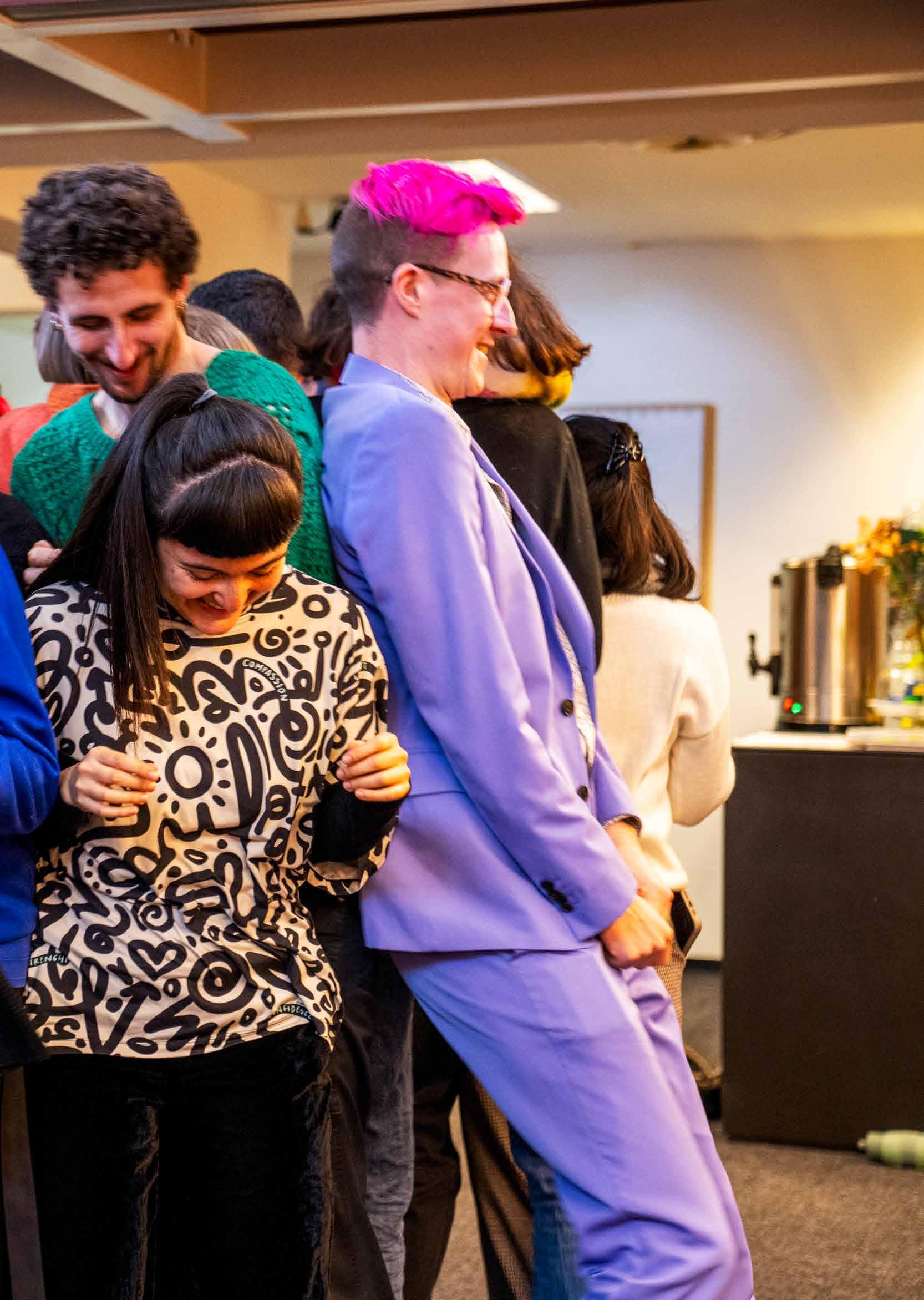
Published by
Royal Academy of Art, The Hague
© September 2024
Editors
Niels Schrader
Oliver Doe
Photography
Roel Backaert and Karolina Uskakovych
Design
Jaap Smit
Disclaimer: The information shown in this publication has been compiled with care by the Royal Academy of Art, The Hague, but the correctness and completeness of it cannot be guaranteed. We have done our best to trace all copyright holders with regard to visual material. No rights can be derived in any way from the contents of this publication.
nln.kabk.nl